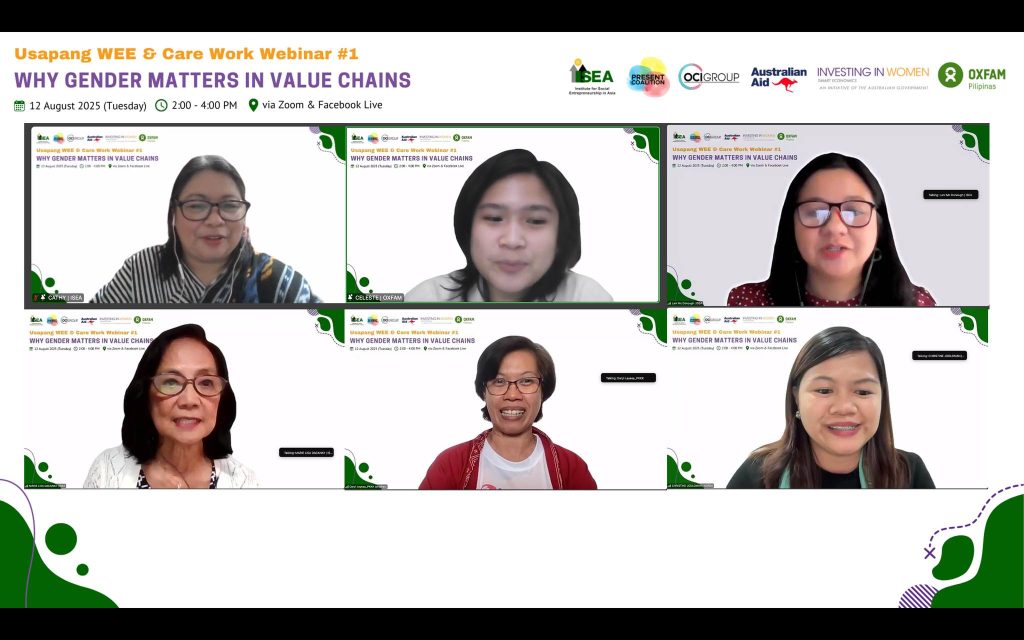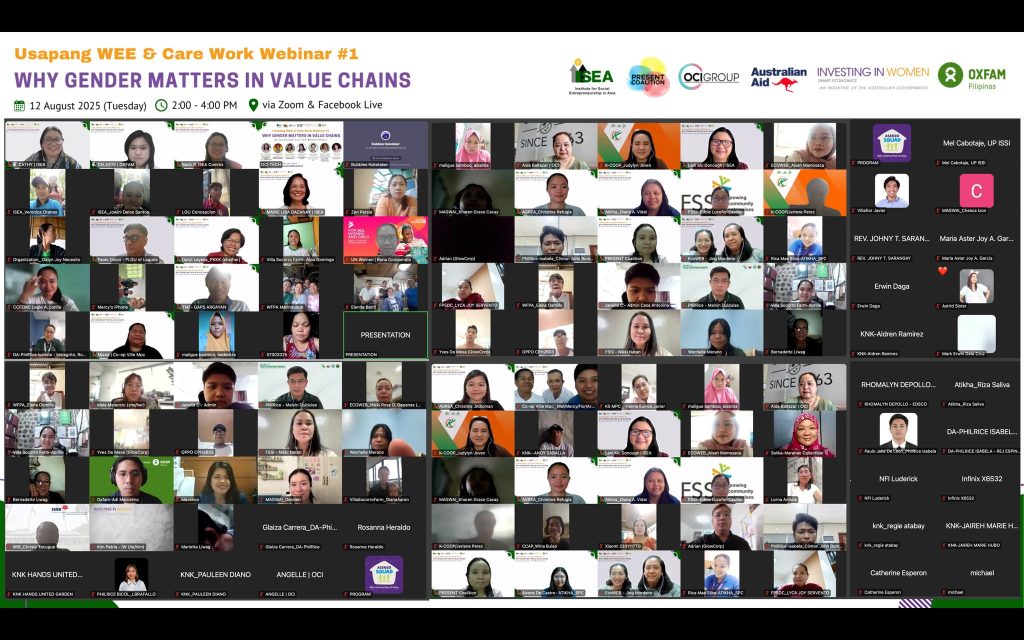
On August 12, 2025, the WEE Connect Community of Practice launched its first Usapang WEE and Care Work Webinar, bringing together 142 participants from 38 organizations across the Philippines. The session highlighted why gender matters in value chains, especially in agriculture, and was streamed via Zoom and Facebook Live.
Dr. Marie Lisa Dacanay, President of the Institute for Social Entrepreneurship in Asia (ISEA) and Convener of the PRESENT Coalition, welcomed the participants to the Usapang WEE and Care Work Webinar, introducing the EmpowerHer Project and WEE Connect Community of Practice. She explained that the series is designed to help social enterprises and their value chain partners learn together, share stories, and advance gender equality in communities and workplaces, concluding with the question for the participants: “What do you want to start, continue, or change in your home, workplace, or community to advance gender equality and WEE?”

Gender Concepts, Frameworks, and the Philippine Context
Ms. Maria Daryl Leyesa of Pambansang Koalisyon ng Kababaihan sa Kanayunan (PKKK) shared the history behind the International Women’s Day, reminding us that women’s struggles for fairness, respect, and rights go back more than a century. She explained that gender is not about biology, but also about how society shapes roles, expectations, and opportunities. She emphasized that care work, often carried by women, with women spending an average of 6.5 hours a day (nearly 3 times more than men), is undervalued yet essential for households, communities and the economy. While the Philippines continues to rank high in global gender indices, women still face barriers such as heavier care responsibilities, stepping back from work during childbearing years, and harmful practices like child marriage. Ms. Leyesa asserted that women’s rights are human rights and that gender equality is not anti-men but rather a societal benefit that uplifts everyone. She highlighted that true development means inclusiveness, fairness and respect for all. Her message ended with hope and encouragement for women to claim their power, voice and choices in both their economic and political life.
Women in Agricultural Value Chains
Ms. Leilani Briosos-Mc Donough of ISEA explored the intersection of gender and agriculture using the Benchmarks for Transformational Partnership and Women’s Economic Empowerment Framework. Her presentation examined the multiple roles of women in agricultural value chains, noting their contributions in farming, marketing, household work and community work, much of which remains unpaid or underpaid. She noted that agricultural work often becomes an extension of women’s domestic responsibilities and they are faced with challenges including physical strain from manual farm work, lack of access to agricultural services, and time poverty due to care work. She highlighted women’s limited ownership of land and assets, as well as their significant role in managing household finances and accessing credit. Despite active participation and leadership in organizations, women often face barriers such as distance, cost, and domestic responsibilities that limit full engagement. The Benchmarks were introduced as a tool to assess adherence of social enterprises, MSMEs and corporate agribusinesses to transformational practices which include enabling workplace policies and culture, women’s participation and leadership, access to resources, partnerships, community-based innovations, and accountability in advancing women’s economic empowerment in agriculture. and building more equitable and resilient agricultural systems.
Stories from the Field
AGREA Foundation’s Christine Jodloman and Coop Ville Multipurpose Cooperative’s Mary Jane Sabut shared inspiring practices from their organizations that are promoting women’s economic empowerment and transforming communities.
Ms. Jodloman shared how AGREA works to lift farming and fishing families out of poverty while promoting food security and climate resilience. Through its Women Farmer Leadership program, AGREA helps women step into leadership roles with trainings that are gender-sensitive, offering flexible schedules and childcare support. Its flagship initiative, FORWARD (Fostering Opportunities and Economic Roles of Women in Agriculture and Resilient Development), puts women at the heart of farming and rural development, and inspired the creation of Women Food Producers Associations. AGREA also connects women-led enterprises and small farmers directly to markets and helps them access land, credit, training, and technology. Ms. Jodloman highlighted AGREA’s integrated approach, combining education, livelihood development, policy engagement, and community storytelling to advance women’s economic empowerment and inclusive value chains. She believes that when women farmers are empowered, whole communities benefit with better food, education, and healthier families.
Ms. Sabut shared that Coop Ville, a housing initiative of the Federation of Peoples’ Sustainable Development Cooperative (FPSDC), has grown beyond providing shelter by integrating livelihood, sustainability, and social services into its design. The project, with 176 housing units and 490 residents, features thematic zones that balance housing, farming, small enterprises, and recreation. Women play an active role in planning and governance, and the community has since been organized as a women-led cooperative. Through trainings and livelihood opportunities, women are empowered to take on leadership roles and drive economic activities. Coop Ville also operates a coco sugar facility under FPSDC’s HIVE social franchising model, strengthening its agricultural value chain and market connections. Ms. Sabut emphasized that women’s inclusion in governance creates safer, stronger, and more inclusive communities. She added that partnerships amplify these gains by opening access to resources, expertise, and broader opportunities for growth.
Reflections from the Participants
Ms. Diana Vidal of Atikha Overseas Workers and Communities Initiative, Inc. and Mr. Charlie Trozo of Ecosystems Work for Essential Benefits (ECOWEB), Inc. shared their reflections highlighting persistent gender stereotypes and the need for shared responsibility and women’s inclusion.
Ms. Vidal noted that gender role stereotypes still persist, such as the view that budgeting is a woman’s job, and stressed that financial responsibilities should be shared within families. For her, the session highlighted that gender equality is a collective responsibility, one that recognizes women’s voices and values their work, supports their leadership, and makes sure opportunities are shared at home and in the community. Mr. Trozo noted that women in agricultural communities are becoming more empowered, actively joining meetings, consultations, and forums, while men remain focused on income-generating activities and household roles are still uneven. He stressed the importance of balancing gender roles, involving women in all areas of community life, and ensuring that youth and social enterprises integrate gender perspectives into development initiatives.
This webinar session was moderated by Ms. Catherine Tiongson, Project Coordinator of ISEA for the EmpowerHer Project and Ms. Maria Celeste Barroso, Resilience Portfolio Officer on Women Economic Empowerment of Oxfam Pilipinas. The webinar is part of the EmpowerHer Project: Embedding Gender Equality in Business Praxis of MSMEs in the Philippines, which is being implemented by ISEA and PRESENT Coalition, in partnership with Oxfam Pilipinas and with support from the Australian Government’s Investing In Women initiative.
The webinar reinforced that gender equality is not just a women’s issue—it’s a societal responsibility. Recognizing care work and women’s leadership in value chains is also key to building inclusive and resilient communities.
